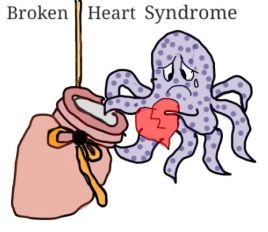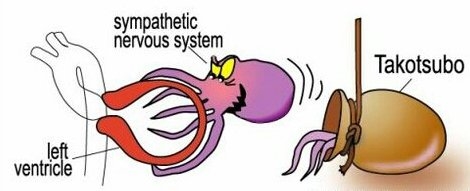With the New Year in full swing, we often look back to the previous year and reflect on how well it went for us and how we can improve moving forward. One of the most notable recurring events of the last year would have to be the number of celebrity deaths that 2016 had claimed, from David Bowie to Mohammed Ali, and most recently Carrie Fisher of Star Wars fame; 2016 goes down as one of the most celebrity death filled years in recent memory. While the passing of widely known individuals is tragic in its own right, what really caught my attention what the passing of Carrie Fishers mother; Debbie Reynolds who shortly after learning of her daughter’s death, passed away herself a day later, having presumably succumbed to “
Broken Heart Syndrome”.

Reporters who spoke to the family about Ms. Reynolds passing are quoted as saying “
…she really wanted to be with Carrie, in those precise words and, within 15 minutes from that conversation, she faded out. Within 30 minutes, she technically was gone.” A grieving mother seemingly overburdened by her daughter’s death, surely something no parent should have to endure.
With the advancements in field of science and our understanding of the human body, it seems like passing away suddenly due to an
extreme emotional stressor only appears in the movies or in a well-written work of fiction. However, scientific ties have been established between depression, mental health and heart disease, with extremely stressful events having a real tangible impact on our wellbeing.
Broken heart syndrome, also known as stress-induced cardiomyopathy or
takotsubo cardiomyopathy presents with bulging out of the left ventricle apex of the heart with a hyper-contractile base; vital for pumping blood throughout the body. Symptoms may manifest as chest pain and shortness of breath shortly after a particularly stressful event; emotional or physical, therefore mimicking the effects of a heart attack. Sudden illness, the loss of a loved one, or even a natural disaster may all cause an unpredictable amount of stress leading to the failure of our most vital organ, the heart.

The exact reasoning for this phenomenon is not fully understood with leading experts suggesting stress hormones such as
adrenaline (responsible for the simulation of our sympathetic nervous system) responsible for essentially “
stunning” the heart muscles to the extent that they are unable to contract effectively. Other rational include transient vasospasm of the coronary arteries, which could cause enough loss of blood flow leading to transient stunning of the myocardium (heart muscle cells).
While these may have played a role in the case of Ms. Reynolds, her past medical history may have also contributed to her untimely demise. It was discovered that she had a history of previous health related problems including two bouts of minor strokes; physical stressors likely compounding her already distraught emotional state. While no post-mortem medical examination was carried out, it was her doctor’s medical opinion that Ms. Reynolds likely passed away from a
stress-related stroke.
Coming from a medical background myself, I am surrounded by logical thinking and astute diagnosis, so when hearing about this story I just had to learn more about it. Knowing that our will and emotions can cause such ramifications on our health makes me value the human spirit for its strength and its fragility; how simply having the medical knowledge behind how things happen is often only half the story.

 Reporters who spoke to the family about Ms. Reynolds passing are quoted as saying “…she really wanted to be with Carrie, in those precise words and, within 15 minutes from that conversation, she faded out. Within 30 minutes, she technically was gone.” A grieving mother seemingly overburdened by her daughter’s death, surely something no parent should have to endure.
Reporters who spoke to the family about Ms. Reynolds passing are quoted as saying “…she really wanted to be with Carrie, in those precise words and, within 15 minutes from that conversation, she faded out. Within 30 minutes, she technically was gone.” A grieving mother seemingly overburdened by her daughter’s death, surely something no parent should have to endure.
 The exact reasoning for this phenomenon is not fully understood with leading experts suggesting stress hormones such as adrenaline (responsible for the simulation of our sympathetic nervous system) responsible for essentially “stunning” the heart muscles to the extent that they are unable to contract effectively. Other rational include transient vasospasm of the coronary arteries, which could cause enough loss of blood flow leading to transient stunning of the myocardium (heart muscle cells).
The exact reasoning for this phenomenon is not fully understood with leading experts suggesting stress hormones such as adrenaline (responsible for the simulation of our sympathetic nervous system) responsible for essentially “stunning” the heart muscles to the extent that they are unable to contract effectively. Other rational include transient vasospasm of the coronary arteries, which could cause enough loss of blood flow leading to transient stunning of the myocardium (heart muscle cells).